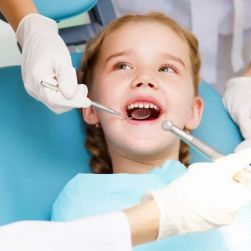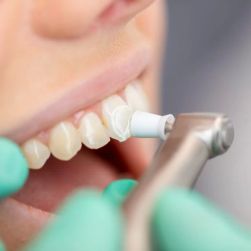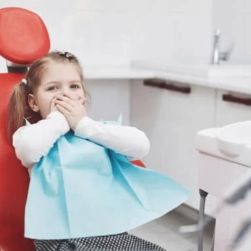How to Care for Your Child's Baby Teeth
As a parent, ensuring your child’s oral health is one of the most important things you can do for their well-being. Baby teeth, or primary teeth, are the first set of teeth children grow, and while they are temporary, they serve critical roles in your child's development. Baby teeth help children speak clearly, chew food properly, and maintain space for adult teeth to come in. However, many parents overlook the importance of caring for baby teeth, mistakenly assuming that these teeth don’t require the same attention as permanent teeth.
In the United States, pediatric dentistry guidelines suggest that a child should visit a dentist as soon as their first tooth appears or by their first birthday, whichever comes first. This early introduction to dental care can help establish good oral hygiene habits, prevent early childhood cavities, and address any potential dental issues before they become more significant concerns. In this article, we will discuss the essential steps in caring for your child’s baby teeth, providing you with the knowledge and tools to ensure a lifetime of healthy smiles for your little one.
The Importance of Caring for Baby Teeth
Caring for your child’s baby teeth is critical because these early teeth play a key role in your child's overall dental health. If neglected, baby teeth can develop cavities or even fall out prematurely, which may disrupt the alignment of permanent teeth when they emerge. Primary teeth also guide the growth of adult teeth, ensuring that they come in straight and healthy. A healthy set of baby teeth reduces the risk of gum disease and sets the stage for a lifetime of oral health. Regular care can help avoid complications like tooth decay and misalignment, which may require expensive orthodontic treatments later in life.
Proper Brushing Techniques for Baby Teeth
Teaching your child proper brushing habits as soon as their first tooth appears is vital to long-term oral health. The American Academy of Pediatric Dentistry (AAPD) recommends brushing your child's teeth twice a day with a small, soft-bristled toothbrush. You should use a smear of fluoride toothpaste about the size of a grain of rice until your child is 3 years old. Once your child turns 3, you can increase the amount of toothpaste to a pea-sized amount. Make sure to brush all surfaces of the teeth, including the front, back, and chewing surfaces, to remove plaque and food particles.
As your child grows, they may want to start brushing on their own. It’s important to supervise their brushing routine until they are about 6 or 7 years old, as young children may not have the manual dexterity to brush thoroughly. A fun, encouraging approach to brushing can also help establish good habits. Letting them choose their toothbrush and toothpaste (with flavors they like) can make the process more enjoyable, turning it into a positive part of their daily routine.
Flossing: A Crucial Step for Baby Teeth
Flossing is often overlooked when it comes to baby teeth, but it’s an essential part of a child’s oral hygiene routine. As your child’s teeth begin to touch each other, usually around the age of 2 or 3, it’s time to start flossing. While brushing removes food and plaque from the surfaces of the teeth, flossing helps clean the areas between teeth that a toothbrush can’t reach. Use a piece of floss about 18 inches long, wrap it around your fingers, and gently slide it between your child’s teeth, curving it around each tooth to remove debris.
If flossing is difficult for your child, try using floss picks, which are small, easy-to-use tools designed to help children floss effectively. Flossing should become part of your child’s morning and evening routine. Like brushing, it should be supervised until they develop the ability to do it independently.
Diet and Nutrition’s Impact on Oral Health
A balanced diet plays a significant role in the health of your child’s baby teeth. The food your child eats can either support or undermine their oral health. Sugary snacks and drinks, such as soda, fruit juice, and candies, can lead to cavities by feeding the harmful bacteria in your child's mouth. These bacteria produce acids that erode tooth enamel and cause cavities. On the other hand, a diet rich in calcium, vitamin D, and phosphorus helps strengthen your child's teeth and bones.
Incorporating tooth-friendly foods like milk, cheese, yogurt, and leafy greens can help maintain strong teeth. Additionally, foods high in fiber, such as fruits and vegetables, can help clean the teeth naturally and stimulate saliva production, which helps neutralize acids in the mouth. Encouraging your child to drink water, especially after meals, can help wash away food particles and prevent plaque buildup. The less sugar they consume, the better their chances are for having healthy baby teeth.
Regular Dental Checkups for Your Child
Taking your child to the dentist regularly is one of the most important aspects of caring for their baby teeth. The first dental visit should take place by the time your child turns 1, or when their first tooth appears. The dentist will examine your child's teeth and gums, check for any signs of tooth decay or developmental issues, and offer advice on oral care. Regular dental visits help detect problems early, often before they become painful or more difficult to treat.
From age 2 and beyond, your child should see the dentist every six months for checkups. During these visits, the dentist will clean your child’s teeth, check for cavities, and apply fluoride treatments if necessary. Dental professionals can also offer additional guidance on any specific dental concerns you may have, such as thumb-sucking, teething pain, or pacifier use. These visits help establish a routine of dental care and set the foundation for a lifetime of healthy smiles.
Managing Teething and Common Dental Issues in Babies
Teething can be a challenging time for both children and parents, often causing discomfort and irritability as baby teeth emerge. Teething typically starts around 6 months of age and continues until the child’s first set of teeth is fully in, around age 3. While teething, children may experience swollen, tender gums and a desire to chew on objects for relief.
To ease teething pain, you can give your child a chilled teething ring or a clean, cold washcloth to chew on. Avoid using teething gels or medicines without consulting your pediatrician. If your child seems particularly uncomfortable, consult your dentist for safe teething remedies. Additionally, pacifiers and thumb-sucking can impact the alignment of baby teeth, so it’s important to address these behaviors early on to prevent potential dental problems.
Conclusion: Starting Early for Lifelong Dental Health
Caring for your child’s baby teeth is an essential step in ensuring they develop a lifetime of good oral health. From early brushing and flossing to regular dental visits and a balanced diet, there are many ways you can help your child maintain strong, healthy teeth. Remember that baby teeth are important in guiding the development of permanent teeth, so it’s crucial to protect them from cavities and other dental issues.
Establishing a routine of oral care early on and providing the right nutrition will set your child up for success as they grow older. By starting early with proper dental habits, you’re laying the groundwork for their future smile. If you ever have concerns about your child’s oral health, don’t hesitate to reach out to a pediatric dentist. A healthy smile begins with healthy baby teeth.
For more helpful tips and information about children's oral health, visit Dentistry Toothtruth today.






